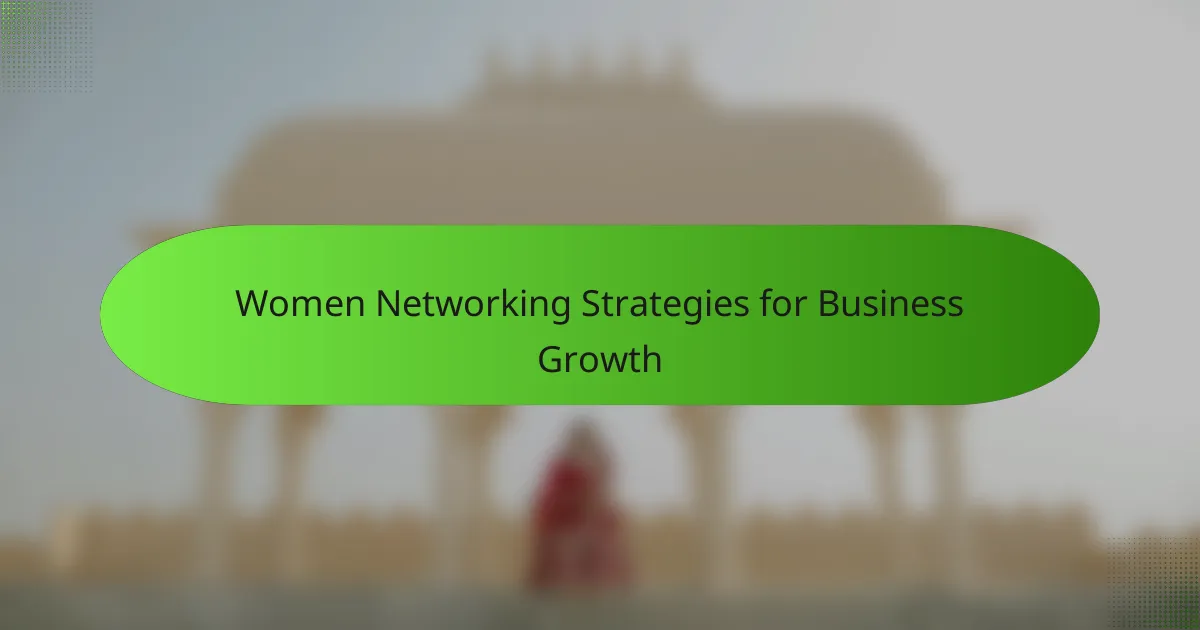Building powerful connections is essential for women in business to thrive in competitive environments. This article explores the unique traits that empower female entrepreneurs, the impact of cultural perceptions on networking strategies, and effective approaches to enhance relationship-building. Discover how resilience, empathy, and strategic mentorship can drive professional growth and collaboration in diverse settings.

What are the key characteristics of women in business?
Women in business demonstrate resilience, strong networking skills, and leadership qualities. They often prioritise collaboration and mentorship, fostering inclusive environments. Research indicates women-led companies tend to perform better in terms of profitability. Unique attributes include diverse perspectives and innovative problem-solving approaches, enhancing overall business strategies.
How do women build powerful connections in their professional lives?
Women build powerful connections in their professional lives by leveraging networking, mentorship, and collaboration. Networking allows women to expand their professional circles through events and social media. Mentorship provides guidance and support, fostering career growth and confidence. Collaboration encourages teamwork, creating opportunities for shared success. Active participation in industry groups enhances visibility and influence. Building authentic relationships based on trust and mutual respect is crucial for long-term connections.
What common challenges do women face in networking?
Women often face challenges like gender bias, limited access to influential networks, and balancing professional and personal responsibilities in networking. These obstacles can hinder their ability to build powerful connections. Research indicates that women are less likely to be invited to networking events, which can impact their career advancement. Additionally, societal expectations may lead to self-doubt, affecting their confidence in networking situations. Addressing these challenges requires targeted strategies to enhance visibility and support among peers.
What barriers exist for women in business networking?
Women in business face several barriers in networking. These include lack of access to influential networks, gender biases, and societal expectations. Women often encounter challenges in establishing credibility, leading to fewer opportunities for meaningful connections. Research indicates that women are underrepresented in networking events, limiting their visibility and influence. Additionally, the perception of women as less assertive can hinder their ability to forge strong business relationships.
How do societal expectations impact women’s networking opportunities?
Societal expectations often limit women’s networking opportunities by reinforcing traditional gender roles. Women face pressures to prioritise family over career, which can restrict their professional connections. Additionally, stereotypes about women’s capabilities can lead to exclusion from influential networks. Research indicates that women are less likely to be invited to informal networking events, crucial for building relationships. Addressing these barriers requires intentional efforts to create inclusive environments that support women’s professional growth.
What strategies do successful women use to cultivate connections?
Successful women cultivate connections through strategic networking, mentorship, and collaboration. They prioritise building authentic relationships, leveraging social media for outreach, and attending industry events. These strategies enhance visibility and foster support networks. Unique attributes include their ability to navigate diverse environments and utilise emotional intelligence effectively. As a result, they create powerful connections that drive career advancement.
Which networking platforms are most effective for women?
LinkedIn, Facebook Groups, Instagram, Meetup, and Twitter are effective networking platforms for women in business. These platforms offer diverse opportunities for connection, collaboration, and professional growth.
LinkedIn is particularly valuable for its professional focus, facilitating industry-specific networking. Facebook Groups foster community support and collaboration among women entrepreneurs. Instagram allows for visual storytelling and brand building, while Meetup provides in-person networking opportunities. Twitter enables real-time engagement and sharing of insights.
Women can leverage these platforms to build powerful connections that enhance their business ventures.
How can mentorship enhance women’s professional networks?
Mentorship significantly enhances women’s professional networks by providing support, guidance, and opportunities for collaboration. Mentors can introduce mentees to influential contacts, helping them expand their connections. A study found that women with mentors are 36% more likely to receive promotions compared to those without. Furthermore, mentorship fosters confidence, enabling women to navigate challenges and pursue leadership roles effectively. This relationship not only builds individual careers but also strengthens the collective presence of women in various industries.

What unique attributes define female entrepreneurs?
Female entrepreneurs are defined by their resilience, innovative thinking, and ability to network effectively. These unique attributes enable them to navigate challenges and build powerful connections in business. Resilience helps them overcome obstacles while innovative thinking drives creative solutions. Networking skills allow them to foster relationships that can lead to collaboration and growth opportunities. This combination of traits distinguishes female entrepreneurs in the competitive landscape of business.
How do women-led businesses differ from their male counterparts?
Women-led businesses often prioritise collaboration and community engagement, setting them apart from male counterparts. Research indicates that women entrepreneurs tend to foster inclusive environments, which enhances team dynamics and innovation. Additionally, women-led firms frequently focus on sustainability and social responsibility, reflecting their unique values. This approach can lead to stronger customer loyalty and brand reputation. Overall, the distinct leadership styles and priorities of women in business contribute to diverse and powerful connections within their networks.
What role does emotional intelligence play in women’s business success?
Emotional intelligence significantly enhances women’s business success by fostering effective communication and strong relationships. It enables women to navigate challenges, resolve conflicts, and inspire teams. Research indicates that women with high emotional intelligence often excel in leadership roles, demonstrating empathy and collaboration. This unique attribute allows them to create inclusive environments, driving innovation and productivity. As a result, emotional intelligence becomes a crucial factor in achieving sustainable business growth.
How can women leverage emotional intelligence in networking?
Women can leverage emotional intelligence in networking by fostering authentic connections and understanding others’ perspectives. This skill enhances relationship-building, leading to more meaningful professional interactions. Emotional intelligence enables women to read social cues, manage conflicts, and communicate effectively, which are essential in networking environments. As a result, they can create supportive networks that empower their careers and promote collaboration.

What rare traits contribute to the success of women in business?
Women in business often succeed due to unique traits such as resilience, empathy, and strong networking skills. These rare attributes enable them to build powerful connections and navigate challenges effectively. Resilience allows them to overcome setbacks, while empathy fosters collaboration and understanding in teams. Strong networking skills enhance their ability to create valuable relationships that drive business success.
How do women overcome stereotypes in the business world?
Women in business overcome stereotypes by leveraging networking, mentorship, and resilience. Building powerful connections helps women navigate challenges and assert their presence in the workplace. For instance, strong mentorship programmes can enhance visibility and provide guidance, enabling women to break through barriers. Additionally, women often demonstrate unique leadership styles that prioritise collaboration and inclusivity, which can reshape traditional business dynamics. As a result, these strategies empower women to redefine their roles and influence in the business world.
What innovative approaches do women take in leadership roles?
Women in leadership roles often utilise innovative approaches to foster collaboration and drive results. They emphasise emotional intelligence, which enhances team dynamics and communication. Additionally, women frequently adopt mentoring strategies, empowering others to grow and succeed. Research indicates that diverse leadership teams yield better decision-making and performance, showcasing the unique contributions women bring to business environments.

How do cultural perceptions influence women’s networking strategies?
Cultural perceptions significantly shape women’s networking strategies by influencing their approach, confidence, and opportunities. In cultures that prioritise collectivism, women may engage more in group networking, fostering relationships through shared experiences. Conversely, in individualistic cultures, women might adopt competitive networking strategies, focusing on personal achievements. Research indicates that women often face unique challenges in networking due to societal expectations, which can affect their professional growth. Understanding these cultural nuances helps women navigate networking effectively, leveraging their strengths to build powerful connections in diverse environments.
What are the local variations in women’s networking practices?
Local variations in women’s networking practices reflect cultural, social, and economic differences. In some regions, women may prioritise informal gatherings and community-based support, while in others, structured events and professional organisations dominate. For instance, in North America, networking often occurs through formal events and conferences, emphasising career advancement. Conversely, in parts of Asia, women may rely on family connections and local community groups for networking opportunities. These practices highlight the unique attributes of women’s networking, shaped by regional values and societal norms.
How can women adapt their networking strategies to different cultural contexts?
Women can adapt their networking strategies to different cultural contexts by understanding local customs and communication styles. This awareness enhances relationship-building and fosters trust. Tailoring approaches, such as using appropriate greetings and respecting hierarchical structures, is crucial. Additionally, leveraging online platforms can bridge cultural gaps, allowing for diverse connections. Engaging in cultural events can further deepen understanding and strengthen networks.

What best practices can women follow to enhance their networking?
Women can enhance their networking by adopting strategic approaches. Building authentic relationships is crucial; prioritise quality over quantity in connections. Attend industry-specific events to meet like-minded professionals and expand your network. Leverage social media platforms, particularly LinkedIn, to engage with peers and share insights.
Mentorship plays a significant role; seek mentors who can offer guidance and introduce you to valuable contacts. Additionally, practice effective communication skills, including active listening and confidence in presenting your ideas. Establishing a personal brand helps convey your unique strengths and expertise, making you more memorable in networking situations.
What common mistakes should women avoid in business networking?
Women should avoid common mistakes like not having a clear networking goal, failing to follow up, and neglecting to showcase their achievements. These pitfalls can hinder the development of powerful connections essential for success in business. Notably, many women overlook the importance of confidence in their networking approach, which can impact their perceived value. Additionally, avoiding diverse networks limits exposure to new opportunities and perspectives. By being mindful of these mistakes, women can enhance their networking effectiveness and build stronger relationships in the business world.
How can women effectively follow up after networking events?
Women can effectively follow up after networking events by sending personalised messages, expressing gratitude, and proposing future interactions. Building strong connections requires timely and thoughtful communication.
1. Send a personalised message within 24-48 hours.
2. Mention specific details from your conversation to reinforce the connection.
3. Express gratitude for their time and insights.
4. Propose a follow-up meeting or call to discuss mutual interests.
5. Connect on professional platforms, like LinkedIn, to stay engaged.
6. Share relevant resources or articles that may interest them.
These steps help maintain relationships and foster collaboration, enhancing women’s networking effectiveness in business.
What actionable tips can women implement to grow their connections?
To grow their connections, women in business can adopt specific actionable strategies. Engage in networking events to meet diverse professionals. Leverage social media platforms to showcase expertise and connect with industry leaders. Join women-focused business groups for mentorship and support. Follow up with meaningful conversations to strengthen relationships.



